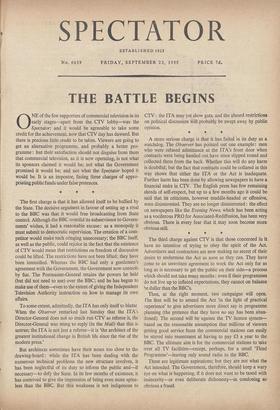THE BATTLE BEGINS
0 NE of the few supporters of commercial television in its early stages—apart from the CTV lobby—was the Spectator; and it would be agreeable to take some credit for the achievement, now that CTV day has dawned. But there is precious little credit to be taken. Viewers are going to get an alternative programme, and probably a better pro- gramme : but their satisfaction should not disguise from them that commercial television, as it is now operating, is not what its sponsors claimed it would be; not what the Government promised it would be; and not what the Spectator hoped it would be. It is an impostor, facing three charges of appro- priating public funds under false pretences.
The first charge is that it has allowed itself to be bullied by the State. The decisive argument in favour of setting up a rival to the BBC was that it would free broadcasting from State control. Although the BBC overdid its subservience to Govern- ments' wishes, it had a reasonable excuse: as a monopoly it must submit to democratic supervision. The creation of a com- petitor would make such cringing unnecessary; the BBC itself, as well as the public, could rejoice in the fact that the existence of CTV would mean that restrictions on freedom of discussion could be lifted. The restrictions have not been lifted; they have been intensified. Whereas the BBC had only a gentlemen's agreement with the Government, the Government now controls by fiat. The Postmaster-General retains the powers he held (but did not need to use) over the BBC; and he has begun to make use of them—even to the extent of giving the Independent Television Authority instruction on how to manage its own affairs.
To some extent, admittedly, the ITA has only itself to blame When the Observer remarked last Sunday that the ITA's Director-General does not so much run CTV as referee it, the Director-General was stung to reply (in the Mail) that this is untrue; the ITA is not just a referee—it is 'the architect of the greatest institutional change in British life since the rise of the modern press.'
But architects sometimes have their noses too close to the drawing-board : while the ITA has been dealing with the numerous technical problems the new structure involves, it has been neglectful of its duty to inform the public and—if necessary—to defy the State. In its few months of existence, it has contrived to give the impression of being even more spine- less than the BBC. But this weakness is not indigenous to CTV : the ITA may yet show guts, and the absurd restrictions on political discussion will probably be swept away by public opinion.
A more serious charge is that it has failed in its duty as a watchdog. The Observer has pointed out one example : men who were refused admittance at the 1TA's front door when contracts were being handed out have since slipped round and collected them from the back. Whether this will do any harm is doubtful; but the fact that contracts could be collared in this way shows that either the ITA or the Act is inadequate. Further harm has been done by allowing newspapers to have a financial stake in CTV. The English press has few remaining shreds of self-respect, but up to a few months ago it could be said that its criticisms, however muddle-headed or offensive, were disinterested. They are no longer disinterested : the effect on newspapers like the Evening News, which has been acting as a vociferous PRO for Associated-Rediffusion, has been very obvious. There is every fear that it may soon become more obvious still.
* * *
The third charge against CTV is that those concerned in it have no intention of trying to obey the spirit of the Act. Advertisers and contractors are now making no secret of their desire to undermine the Act as soon as they can. They have come to an unwritten agreement to work the Act only for as long as is necessary to get the public on their side—a process which should not take many months : even if their programmes do not live up to inflated expectations, they cannot on balance he duller than the BBC's.
Then, at the right moment, two campaigns will open. the first will be to amend the Act 'in the light of practical experience' to give advertisers more direct say in programme planning (the pretence that they have no say has been aban- doned). The second will be against the TV licence system— based on the reasonable assumption that millions of viewers getting good service from the commercial stations can easily be stirred into resentment at having to pay £3 a year to the BBC. The ultimate aim is for the commercial stations to take over all TV facilities—except, perhaps, for a small 'Third Programme'—leaving only sound radio to the BBC.
These are legitimate aspirations; but they are not what the Act intended. The Government, therefore, should keep a wary eye on what is happening, if it does not want to be taxed with insincerity—or even deliberate dishonesty—in condoning so obvious a fraud.
































 Previous page
Previous page